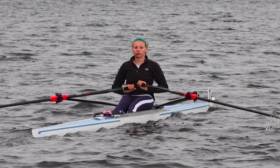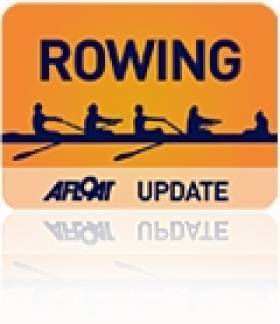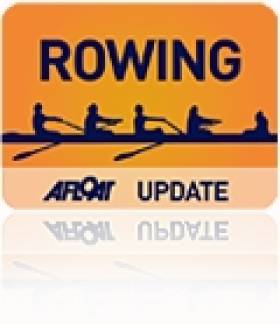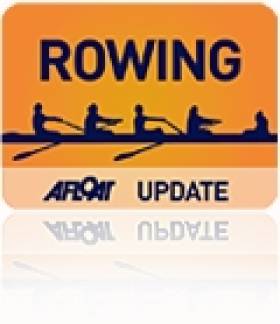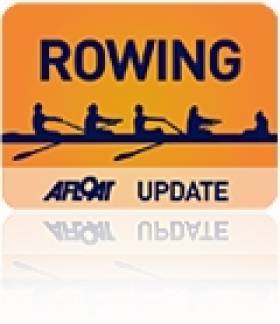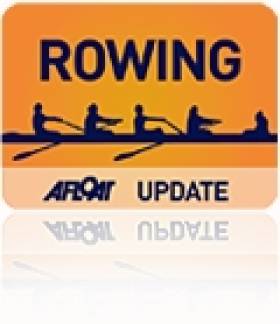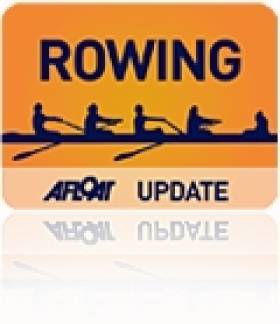Displaying items by tag: Irish Championships,
Rowers Set for Coastal Rowing Championships
#Coastal Rowing: The inaugural Irish Coastal Rowing Championships will take place this Saturday and Sunday, August 18th and 19th at the National Rowing Centre in Farran Wood, Cork. Clubs from all four provinces are set to compete.
Eddie Farr, chair of the Coastal Championships Committee, said: “This is an incredibly proud moment in all our rowing lives, to at last get to row at our national and international rowing venue.”
The Championships, hosted by Rushbrooke Rowing Club, will see clubs race in over 30 different race categories, ranging from Under 12 to Masters, with race lengths ranging from 800 to 2,300 metres. Several thousand rowers and spectators are expected to attend the two day Championships.
The long-standing All Ireland Coastal Rowing Championships will also be held this weekend, from Friday to Sunday (August 17th to 19th) in Wexford. There will be an array of races in one-design Celtic boats, Currachs, East coast Skiffs, Wexford cots, Kerry four-oars, Donegal skiffs and Seine boats.
NUIG Four Impress at Irish Rowing Championships
#Rowing: NUIG overtook Commercial and won the men's senior four at the Irish Rowing Championships in Cork today. The other senior title on offer in the second session of finals at the National Rowing Centre went to Mark O'Donovan in the single sculls. The 26-year-old Skibbereen man, rating much higher than his rivals, established an early lead and was not caught. It was his first senior singles sculls crown.
Portora also took the lead early and won the junior 18 eights - but the Cork Boat Club challenge was severe. This fine race lasted right to the line and was decided by under half a second.
Neptune added the women's novice coxed quadruple title to their men's title, won earlier in the day, while UCD won the women's intermediate eight. The Dublin college also took the men's club eight.
Irish Rowing Championships, National Rowing Centre, Cork, Day One (Selected Results)
Men
Eight - Club: UCD 5:56.392. Junior: 1 Portora 5:59.419, 2 Cork 5:59.84, 3 St Joseph's A 6:10.731.
Four - Senior: 1 NUIG 6:03.081, 2 Commercial 6:05.925, 3 Portora 6:09.284. Inter, coxed: 1 NUIG 6:26.811.
Sculling, Quadruple - Novice, coxed: Neptune 6:44.559.
Double - Senior: 1 Skibbereen 6:32.773, 2 UCD 6:34.914, 3 Castleconnell 6:39.727.
Single - Senior: 1 Skibbereen (M O'Donovan) 7:04.162, 2 UCD (T Hughes) 7:10.256, 3 Portadown (S McKeown) 7:12.256. Junior: 1 Clonmel (D Lynch) 7:04.040, 2 Shandon (R Byrne) 7:04.462, 3 Shandon (S O'Sullivan) 7:23.197.
Women
Eight - Intermediate: UCD 6:38.722. Four - Senior: 1 UCD 6:54.652, 2 Skibbereen/UCC 6:58.902, 3 Trinity 7:04.715. Club, coxed: Fermoy 7:16.116.
Four - Junior: 1 Skibbereen 7:05.645, 2 Shandon A 7:13.661, 3 Galway 7:19.145.
Pair - Intermediate: Cork 7:36.488
Sculling, Quadruple - Novice, coxed: Neptune A 7:55.460.
Double - Junior: 1 Skibbereen B 7:19.682, 2 Bann 7:91.995, 3 Neptune 7:33.305.
Skibbereen brought their tally of title for the day to four with a win in the women's junior four.
Rio Olympians Sign Up for Irish Indoor Rowing Championships
#Rowing: The entry for the Irish Indoor Rowing Championships has both quantity and quality, with Irish rowers who are set to compete at the Olympic Games in the mix. Gary O’Donovan will compete in lightweight class and Paul O’Donovan in the under-23 lightweight class.
Claire Lambe, who partnered Sinéad Jennings in the Ireland lightweight women’s double crew which qualified the boat for Rio, is also entered. Jennings may do a Wattbike test.
Among the heavyweight men, Philip Doyle, Sam McKeown and Dave Neale will be among those competing to set the top mark, while Sanita Puspure, an Olympian in 2012, should be the fastest woman.
The Championships have a record entry and will be held in Limerick on January 23rd.
# ROWING: Grainne Mhaol/NUIG won an exciting senior eights final at the Irish Rowing Championships at the National Rowing Centre in Cork today. Queen’s University fought it out with the crew from the Galway college and their old boys’ club, but a Grainne Mhaol/NUIG push in the final 250 metres gave them the big prize in a close finish. The victorious crew dedicated the win to Tom Tuohy, the long-time NUIG coach who died last year in his mid fifties.
Queen’s, in combination with Skibbereen, rowed well to win the women’s senior eights crown, and Portora’s Lloyd Seaman and Henry Millar also impressed as they won the men’s junior pairs title. Amy Bulman of UCD had one of the tightest margins of the three days of the Championships as she beat Karen Corcoran-O’Hare by .34 of a second in the women’s intermediate single sculls final.
UCD won the men’s intermediate double sculls, while Trinity concluded a very good Championships by winning the women’s novice eight. Skibbereen moved their overall total to 136 titles as they won the women’s junior quadruple scull.
Irish Rowing Championships, Day Three (Selected Results)
Men
Eight – Senior: 1 Grainne Mhaol/NUIG 5:38.47, 2 Queen’s 5:40.25, 3 Trinity 5:53.82, 4 St Michael’s 5:57.31.
Four, coxed - Novice: 1 Queen’s 6:32.18, 2 UCC 6:37.29, 3 UCD 6:41.37.
Pair – Intermediate: 1 NUIG 6:50.70, 2 UCD 6:53.88, 3 Lee Valley 6:58.90. Junior: 1 Portora 6:54.35, 2 Commercial 7:01.33, 3 St Joseph’s 7:13.00.
Sculling,
Double – Intermediate: 1 UCD 6:35.90, 2 Neptune 6:38,37, 3 Skibbereen 6:45.99. Junior: 1 Shandon 6:54.84, 2 Skibbereen 6:46.49, 3 Lee 6:48.16.
Single – Senior: 1 Lee Valley (J Keohane) 7:00.30, 2 UCC (N Kenny) 7:03.51, 3 Skibbereen (P O’Donovan) 7:10.09, 4 Offaly (O’Donoghue) 7:26.29, 5 Carlow (Bolger) 7:27.10. UCD (Neale) Dnf.
Women
Eight – Senior: 1 Queen’s LBC/Skibbereen 6:25.48, 2 UCD 6:30.19, 3 Trinity 6:30.40, 4 St Michael’s 6:40.28, 5 NUIG 6:41.79. Novice: 1 Trinity 6:51.68, 2 UCD 6:54.72, 3 NUIG 6:57.71.
Four, coxed – Intermediate: 1 St Michael’s 7:11.00, 2 UCD 7:23.15, 3 NUIG 7:27.26.
Pair – Junior: 1 Bann 7:44.22, 2 Muckross 7:45.21, 3 Cork BC 7:54.81.
Sculling, Quadruple – Junior: 1 Skibbereen 6:55.31, 2 Cork 7:02.99, 3 Shandon 7:04.47.
Single – Senior: 1 Three Castles (H Walshe) 7:42.45, 2 Killorglin (M Dukarska) 7:42.85, 3 Three Castles (E Moran) 7:55.91, 4 Belfast BC (B Jacques) 7:59.48, 5 Three Castles (B Quinn) 8:06.22, 6 Skibbereen (O Hayes) 8:08.54. Intermediate: 1 UCD (A Bulman) 8:04.33, 2 Shandon (K Corcoran-O’Hare) 8:04.67, 3 Trinity (S Dolan) 8:16.55.
# ROWING: For the second year in succession, the final of the women’s senior single scull produced a dramatic finish at the Irish Rowing Championships. Last year Monika Dukarska of Killorglin fell in when within metres of a win, and this year she seemed certain to make amends as she passed Helen Walshe of Three Castles and drove for the line at the National Rowing Centre. But Walshe, who won in 2004 and 2006 for UCD, mounted her own charge and won by .4 of a second.
John Keohane of Lee Valley won the men’s senior single with plenty to spare and there were emphatic wins for Queen’s (in the men’s novice coxed four); NUIG (men’s intermediate pair) and St Michael’s (women’s intermediate coxed four).
Shandon had to hold off a late push by Skibbereen in the men’s junior double scull and the women’s junior pair was also a tremendously close race, with Bann coming out on top in a battle with Muckross.
Irish Rowing Championships, Day Three (Selected Results)
Men
Four, coxed - Novice: 1 Queen’s 6:32.18, 2 UCC 6:37.29, 3 UCD 6:41.37.
Pair – Intermediate: 1 NUIG 6:50.70, 2 UCD 6:53.88, 3 Lee Valley 6:58.90.
Sculling,
Double – Junior: 1 Shandon 6:54.84, 2 Skibbereen 6:46.49, 3 Lee 6:48.16.
Single – Senior: 1 Lee Valley (J Keohane) 7:00.30, 2 UCC (N Kenny) 7:03.51, 3 Skibbereen (P O’Donovan) 7:10.09, 4 Offaly (O’Donoghue) 7:26.29, 5 Carlow (Bolger) 7:27.10. UCD (Neale) Dnf.
Women
Four, coxed – Intermediate: 1 St Michael’s 7:11.00, 2 UCD 7:23.15, 3 NUIG 7:27.26.
Pair – Junior: 1 Bann 7:44.22, 2 Muckross 7:45.21, 3 Cork BC 7:54.81.
Sculling, Single – Senior: 1 Three Castles (H Walshe) 7:42.45, 2 Killorglin (M Dukarska) 7:42.85, 3 Three Castles (E Moran) 7:55.91, 4 Belfast BC (B Jacques) 7:59.48, 5 Three Castles (B Quinn) 8:06.22, 6 Skibbereen (O Hayes) 8:08.54.
# ROWING: The second session of finals on the second day of the Irish Rowing Championships produced two cracking races. Galway Rowing Club won the women’s junior 18 eight final by overhauling Muckross stroke by stroke and then holding off their battling yellow-clad rivals until the line. The men’s senior quadruple sculls produced a surprise victory for the University of Limerick/Castleconnell crew after a similarly gutsy drive which saw them take on and beat Queen’s University.
The final four races were all won by big margins. Claire McIlwaine and Alex Greene gave Queen’s an immediate fillip when they won the women’s senior pair, and Brooke Edgar of Bann in the women’s novice single, Dave Neale of UCD in the intermediate single and Skibbereen in the men’s junior quadruple were all well in charge of their races.
Irish Rowing Championships, National Rowing Centre, Cork. Day Two (Selected Results)
Men
Eight – Intermediate: 1 Trinity 6:11.27, 2 NUIG 6:15.32, 3 UCD 6:15.42.
Four – Junior, coxed: 1 Portora 6:58.48, 2 Bann 7:02.24, 3 St Joseph’s A 7:02.36.
Pair – Senior: 1 Bann (C Black, J Cassells) 6:52.02, 2 Queen’s (P Gilanders, T Oliver) 6:57.09, 3 St Michael’s A (A McEvoy, M O’Brien) 6:59.86
Sculling, Quadruple – Senior: 1 University of Limerick/Castleconnell (L Rice, S Penny, A Sheehan, D Quinlan) 6:03.59, 2 Queen’s 6:04.28, 3 Carlow 6:04.99. Junior: 1 Skibbereen 6:15.17, 2 Shannon 6:26.55, 3 Cork 6:27.76.
Single – Intermediate: 1 UCD (D Neale) 7:12.01, 2 Portora (Monteith) 7:20.31, 3 Castleconnell (Pidgeon) 7:25.16. Novice: 1 Skibbereen (R O’Neill) 7:54.04, 2 Cappoquin (Landers), 3 Clonmel (Murphy) 7:54.39.
Women
Eight - Junior: 1 Galway RC 6:43.41, 2 Muckross 6:46.40, 3 St Michael’s 7:00.20.
Pair – Senior: 1 Queen’s (C McIwaine, A Greene) 7:29.70, 2 St Michael’s 7:40.64, 3 Cork 7:52.04.
Sculling
Double – Intermediate: 1 Skibbereen (L Connolly, E Cialis) 7:46.82, 2 NUIG 7:49.05, 3 Neptune 7:54.38.
Single – Novice: 1 Bann (Edgar) 8:19.22, 2 Commercial (Foley) 8:31.85, 3 Castleconnell (Donegan) 8:43.83. Junior: 1 Fermoy (H Shinnick) 8:12.60, 2 St Michael’s (K O’Brien) 8:14.64, 3 Portora (Cromie) 8:17.35.
Ireland Juniors Black and Cassells Win Senior Pairs Title at Irish Rowing Championships
# ROWING: The junior pair which will represent Ireland at the World Championships next month today won the senior pairs title at the Irish Rowing Championships. Bann’s Chris Black and Joel Cassells are an excellent crew and they showed it by taking a lead at the National Rowing Centre after 500 metres and never relinquishing it despite pressure from St Michael’s of Limerick.
Hilary Shinnick also held off St Michael’s, represented by Kate O’Brien, to win the junior single sculls’ title. Shinnick is just 17, but it was her second successive title. Shinnick will be part of a junior quadruple at the Worlds, while O'Brien will compete in a single scull.
The junior men’s coxed fours went to Portora of Enniskillen, while Skibbereen conitinued to notch up titles – Rory O’Neill took the novice single sculls crown, while Laura Connolly and Ella Cialis took the women’s intermediate double scull.
Trinity continued their good form with a win in the men’s intermediate eights.
Irish Rowing Championships, National Rowing Centre, Cork. Day Two, First Session (Selected Results)
Men,
Eight – Intermediate: 1 Trinity 6:11.27, 2 NUIG 6:15.32, 3 UCD 6:15.42.
Four – Junior, coxed: 1 Portora 6:58.48, 2 Bann 7:02.24, 3 St Joseph’s A 7:02.36.
Pair – Senior: 1 Bann (C Black, J Cassells) 6:52.02, 2 Queen’s (P Gilanders, T Oliver) 6:57.09, 3 St Michael’s A (A McEvoy, M O’Brien) 6:59.86
Sculling, Single – Novice: 1 Skibbereen (R O’Neill) 7:54.04, 2 Cappoquin (Landers), 3 Clonmel (Murphy) 7:54.39.
Women
Sculling, Double – Intermediate: 1 Skibbereen (L Connolly, E Cialis) 7:46.82, 2 NUIG 7:49.05, 3 Neptune 7:54.38.
Single – Junior: 1 Fermoy (H Shinnick) 8:12.60, 2 St Michael’s (K O’Brien) 8:14.64, 3 Portora (Cromie) 8:17.35.
Grainne Mhaol Take Fours Crown at Irish Rowing Championships
# ROWING: Grainne Mhaol had a surprisingly easy win the men’s senior four final at the Irish Championships at the National Rowing Centre in Cork. The crew of Dave Mannion, Alan Martin, Cormac Folan and James Wall led down the course. St Michael’s were second.
The junior men’s eight title also went to Galway, in the form of St Joseph’s, and the junior women’s four was won impressively by Muckross. Queen’s University took the men’s novice eight crown, and Three Castles had plenty to spare in the women’s senior double. Niall Kenny of UCC is the new Ireland champion in the lightweight single scull.
Irish Rowing Championships, Sponsored by SuperValu – Day One (Selected Results; Finals)
Men, Eight – Novice: 1 Queen’s University, Belfast 6:04.55, 2 UCD 6:10.94, 3 Trinity 6:16.26. Junior: 1 St Joseph’s College, Galway 6:03.87, 2 Methodist College, Belfast 6:10.72, 3 Galway RC 6:15.28.
Four – Senior: 1 Grainne Mhaol (D Mannion, A Martin, C Folan, James Wall) 6:19.06, 2 St Michael’s 6:22.35, 3 Queen’s 6:27.21.
Four, coxed – Intermediate: 1 Trinity 6:33.15, 2 NUIG A 6:33.74, 3 Bann 6:35.47.
Sculling, Quadruple – Novice, coxed: 1 Galway 6:55.56, 2 Shandon 6:58.56, 3 NUIG 7:57.82.
Double – Senior: 1 Queen’s (C Williamson, R O’Connor) 6:41.29, 2 Carlow 6:43.83, 3 University of Limerick 6:54.88.
Single – Lightweight: 1 UCC (Kenny) 7:20.40, 2 St Michael’s (O’Connor) 7:35.61, 3 Skibbereen (Burns) 7:35.73. Junior: 1 Skibbereen (P O’Donovan) 7:19.67, 2 Castleconnell (Quinlan), 3 Neptune (Griffin).
Women
Eight – Intermediate: 1 Trinity 6:44,80, 2 UCD 6:45.0, 3 St Michael’s 6:53.50.
Four - Senior: 1 Skibbereen (G Hosford, C Fitzgerald, D Walsh, S Dineen) 7:01.98, 2 Queen’s 7:11.86, 3 UCD 7:14.21. Junior: 1 Muckross 7:18.76, 2 Bann, 3 Galway.
Four, coxed – Novice: 1 NUIG 7:41.38, 2 Trinity 7:44.07, 3 University of Limerick 7:51.97.
Sculling, Double – Senior: 1 Three Castles (H Walshe, E Moran) 7:13.79, 2 Skibbereen 7:24.60. Junior: 1 Belfast BC (L Litvack, B Jacques) 7:36.55. 2 Neptune 7:50.63, 3 Carrick-on-Shannon 7:59.40.
# ROWING: The first session of the Irish Rowing Championships, run in almost perfect conditions at the National Rowing Centre in Cork, finished with some terrific finals.
The closest race was the shootout between NUIG and Trinity in the men’s intermediate coxed four. NUIG had taken over the lead from Trinity and led as the crews charged for the line. But Trinity upped the rate and took the title on the line. Earlier, NUIG had reversed the order as they took the women’s novice coxed four, with Trinity second.
There were a string of impressive wins in senior and junior classes. At senior level the Skibbereen women’s four took their third successive title with ease, and the Queen’s double of Colin Williamson and Rory O’Connor matched the feat. The junior women’s double of Lucie Litvack and Bridget Jacques and single sculler Paul O’Donovan also demonstrated their skills with classy wins.
Irish Rowing Championships – Day One (Selected Results; Finals)
Men
Four, coxed – Intermediate: 1 Trinity 6:33.15, 2 NUIG A 6:33.74, 3 Bann 6:35.47.
Sculling, Double – Senior: 1 Queen’s (C Williamson, R O’Connor) 6:41.29, 2 Carlow 6:43.83, 3 University of Limerick 6:54.88.
Single – Junior: 1 Skibbereen (P O’Donovan) 7:19.67, 2 Castleconnell (Quinlan), 3 Neptune (Griffin).
Women
Four - Senior: 1 Skibbereen (G Hosford, C Fitzgerald, D Walsh, S Dineen) 7:01.98, 2 Queen’s 7:11.86, 3 UCD 7:14.21.
Four, coxed – Novice: 1 NUIG 7:41.38, 2 Trinity 7:44.07, 3 University of Limerick 7:51.97.
Sculling, Double – Junior: 1 Belfast BC (L Litvack, B Jacques) 7:36.55. 2 Neptune 7:50.63, 3 Carrick-on-Shannon 7:59.40.


























